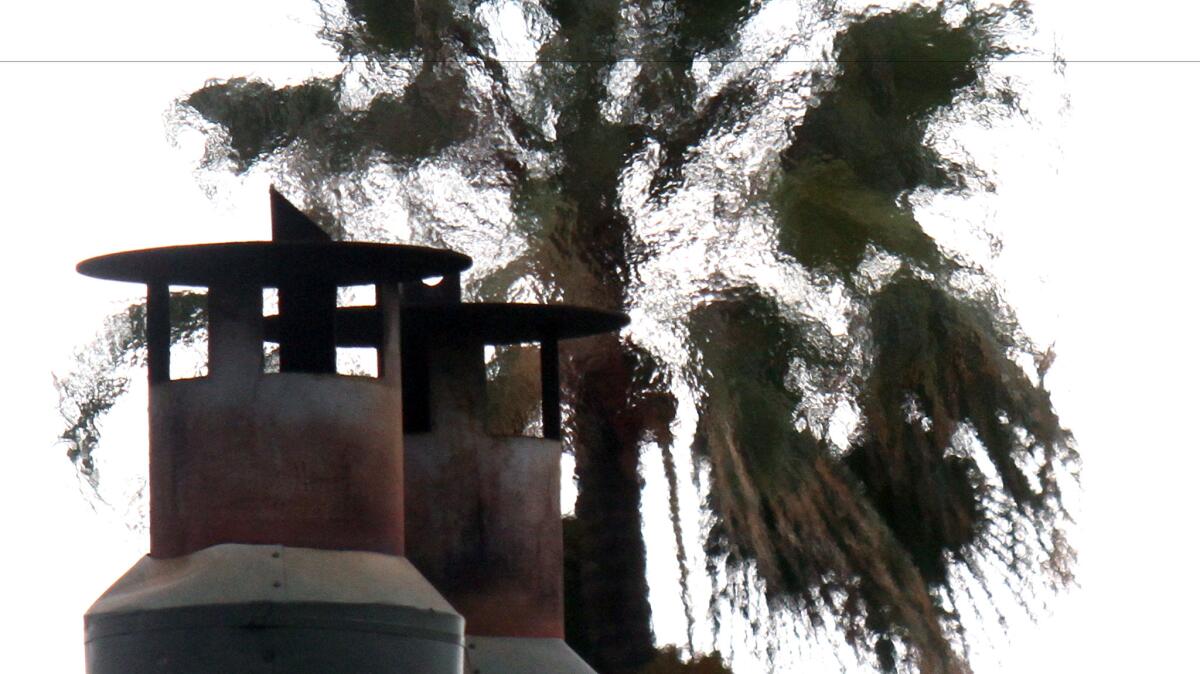Oil company loses battle over installing gas burner at South L.A. site

South Los Angeles residents have scored a victory in a battle with an oil company that drills in their neighborhood, after a city official rejected its plans to burn off gas at the West Adams Boulevard site.
Freeport-McMoRan, which operates the drilling site, had argued that it needed to install an enclosed burner to get rid of unused gas that is pulled up from the earth along with the oil. It argued that the new equipment would cause “near zero emissions” and have little effect on neighbors.
But a Los Angeles zoning official rejected the company’s plans last week, saying he had “major concerns with the level of emissions” near a neighboring apartment complex, houses and an AIDS Healthcare Foundation center.
Such a burner should be in an industrial zone, not a residential area, associate zoning administrator Charles Rausch wrote. He added that the Fire Department had expressed “grave concerns” about installing the proposed burner so close to apartments, including worries about foul smells, toxic substances and the possibility of windblown debris catching fire.
Local residents had fought against the plan, arguing that the city should take a closer look at the environmental effects of burning off gas at the urban site.
“To have a gas flare burning right next to an apartment building -- it was a concern right up front,” said Jeff Camp, president of the United Neighborhoods Neighborhood Council, which opposed the proposal.
Community members also argued it was wasteful to burn off gas that could be used to generate electricity. Michael Salman, who testified against the plan, said the decision was an important test case for Southern California as the World Bank campaigns globally to halt “routine flaring” at drilling sites -- the practice of burning off natural gas instead of capturing and using it.
Residents had also feared that the new equipment would pave the way to expand drilling in their neighborhood, by ramping up the amount of gas that the company could handle.
Freeport-McMoRan argued that the new burner would merely support existing operations at the West Adams site, providing a backup method to dispose of unused gas that it could not sell, re-inject into the ground or turn into electricity – the three methods that it has been using to manage it. It told the city that no environmental review was needed because the burner was being installed to support existing operations that were already approved.
But its arguments failed to convince Rausch, who concluded that the burner wasn’t needed to continue producing oil at the site. If it were being approved, he said, it would have had to undergo environmental review.
Freeport-McMoRan representatives did not respond to requests for comment Tuesday. The California Independent Petroleum Assn., a trade group, said the L.A. decision was the kind of move that hurts mineral owners.
“Denying permits for routine equipment installation which are intended to improve efficiency only serves to suppress job growth in the city, frustrate compliant business operations and increase our state’s dependence on foreign imports,” said Rock Zierman, the association’s chief executive, in a statement.
Camp said he was excited L.A. was enforcing rules on oil drilling set out in city codes -- something he and other critics say it has long neglected to do. But the decision did not address another concern raised by residents: Whether the city should require nonstop monitoring of emissions at the drilling site.
City Council President Herb Wesson, who represents the West Adams area, had urged the Planning Department to insist on such monitoring to swiftly detect leaks. In a letter, he called it “a technology overdue for required use.”
Another South Los Angeles drilling site, run by Allenco Energy Co., was recently ordered to install a monitoring system after a court battle that followed an outpouring of complaints from residents of foul smells, nosebleeds and headaches. However, the court order only requires Allenco to use the monitoring system for four years after resuming operations.
Salman argued that Los Angeles has both the power and the responsibility to demand emissions monitoring to be installed permanently in West Adams and at other drilling sites, based on city codes that say that “proven technological improvements” shall be used to reduce nuisances.
“We don’t require fire alarms only at buildings that have already had fires,” Salman said.
Wesson could not be reached for an interview Tuesday, but said in a brief written statement to The Times that he and the community “continue to stand united in our call for 24-hour emission monitoring at the site.”
Freeport-McMoRan now has less than two weeks to appeal the decision. If it does so, the matter would go to an area planning commission for review.
Follow me on Twitter at @LATimesEmily
ALSO
The ‘Holy Grail’ for earthquake scientists has been accidentally destroyed
L.A. County officials want to raise your property tax to pay for parks
In a battle between South L.A. residents and an oil company, residents won
More to Read
Sign up for Essential California
The most important California stories and recommendations in your inbox every morning.
You may occasionally receive promotional content from the Los Angeles Times.











